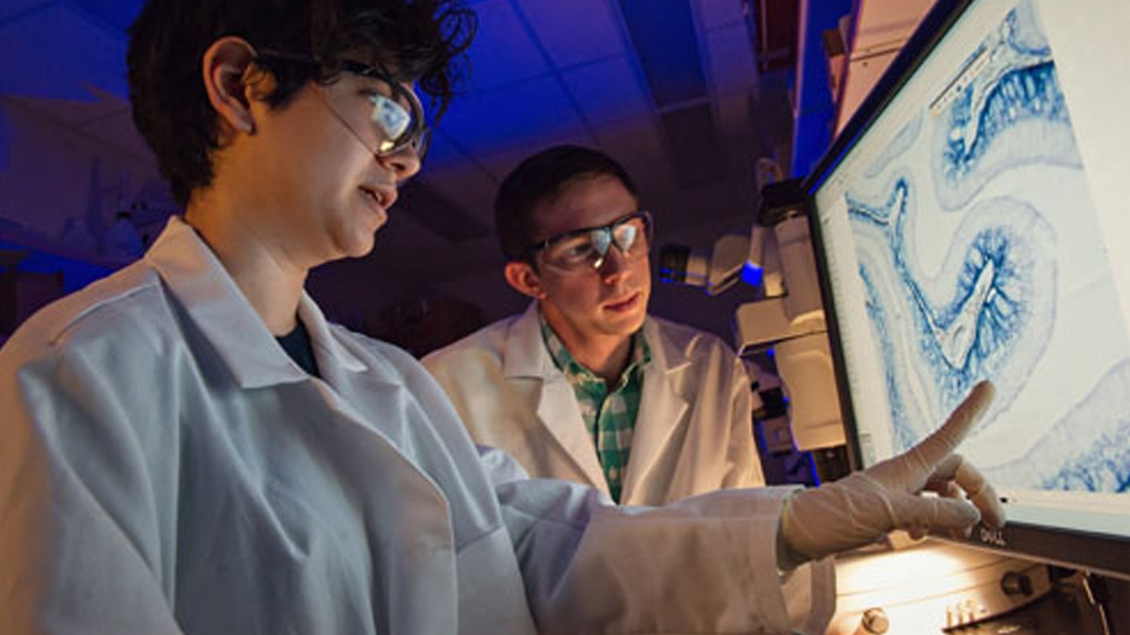-
Bioinformatics -
Biological Chemistry -
Cancer Biology -
Cell & Developmental Biology -
Cellular & Molecular Biology -
Genetics and Genomics -
Health Infrastructures & Learning Systems -
Immunology -
Microbiology & Immunology -
Molecular, Cellular & Developmental Biology -
Molecular & Cellular Pathology -
Molecular & Integrative Physiology -
Neuroscience -
Pharmacology

Cell & Developmental Biology
Excel in a number of different scientific careers
Program Overview
The Graduate Program in Cell & Developmental Biology (CDB) provides outstanding doctoral training in fundamental aspects of cell and developmental biology, ranging from stem cells to regenerative medicine and organogenesis to cancer biology. Research teams in CDB employ high-resolution microscopy, live single cell imaging, biochemistry-based methods, sophisticated genetics including gene editing, and systems-based strategies to understand the basic building block of life, the cell.
Research activities in CDB place a strong emphasis on quantitative and computational skills, cover gametes as well as highly differentiated and specialized cell types, and involve a broad array of model systems including budding yeast, flies, mice and human samples. CDB graduate students thus receive rigorous and comprehensive training and are integral members of a highly collaborative and collegial environment. Together these elements provide exceptional preparation for graduate students to excel in a number of different scientific careers.
CDB faculty work in a very broad range of research areas:
- Aging and degeneration
- Cancer biology
- Cell signaling
- Cellular biophysics
- Computational biology and mathematical modeling
- Developmental genetics
- Gene expression and genomics
- Genetic and molecular models of human disease
- Host-pathogen interactions
- Intracellular transport
- Neurobiology
- Organogenesis and pattern formation in the eye, ear, limb, gut, heart, skeleton, hematopoietic system, urogenital system, reproductive system, and nervous system
- Stem cell biology
- Systems biology
Our faculty and students are extremely interactive and collaborative. Many CDB students have interdisciplinary projects involving multiple laboratories.
CDB is home to several special programs and research facilities:
The Microscopy and Image Analysis Laboratory (MIL), a facility of more than 3,000 square feet housing state-of-the-art microscopy and imaging equipment, is housed within the Department of Cell and Developmental Biology.
The Center for Organogenesis is an interdisciplinary group of scientists working on basic mechanisms by which organs and tissues are formed and maintained, using this knowledge to create long lasting artificial organs, stem cell therapies or organ transplantation systems that will correct genetic and acquired diseases. The Center has run an NIH-supported training grant for over 15 years.
The Michigan Center for hES Cell Research was established in 2002, with funding from the Medical School and the NIH, for the study of human embryonic stem cells. The Consortium for Stem Cell Therapies is now part of the Taubman Institute and provides training and resources for students and faculty interested in ESC and iPSC stem cell research.
Coursework
Course requirements are flexible; the goal is to establish a basic working knowledge of current concepts in molecular biology, cell biology, biochemistry, genetics, and neurobiology while allowing students to pursue more advanced coursework related to their research interests, such as developmental biology, bioinformatics, gene expression, signal transduction, etc. In your first year, you will take the PIBS curriculum, which also fulfils CDB requirements. When you choose a research laboratory in CDB, you will enroll in our Seminars in Cell and Developmental Biology course, CDB 801. You will also select additional program courses and electives from the rich offerings at the University of Michigan.
Preliminary Examination
The preliminary exam consists of two checkpoints. The first is the preliminary exam in the form on a paper discussion. For students in good academic standing, this will take place in August at the end of their first year in order to advance to PhD candidacy. The second checkpoint takes place in the second year and is a vital component of the first thesis committee meeting. This checkpoint is comprised of two steps, the writing of a 6-page fellowship (NIH format) and the oral presentation of the proposed research to the thesis committee.
Teaching Requirement
As part of their professional training, CDB students serve as graduate student instructors (GSIs) in a graduate-level course for one semester.
Expected Length of Program
The usual time to degree is approximately 5 to 5 1/2 years.
CDB students run the course CDB 801 where they take turns presenting their research, give and get feedback on their research and presentations, explore career development opportunities, and interact with their fellow students in a supportive and cohesive environment. CDB students also participate in department committees, invite and host seminar speakers, help organize the annual departmental retreat, and plan/attend monthly happy hours.
CDB students have also expanded their skills and knowledge through university certificate programs such as those in teaching and translational science.
In recent years, a number of CDB students have been heavily involved in an outreach program called Developing Future Biologists (DFB). This is a graduate student-led educational organization that organizes and facilitates a week-long summer course aimed at teaching the next generation of biologists the fundamental concepts of developmental biology regardless of race, gender, or socioeconomic status.
In addition to scientific discovery, our mission is to train future leaders in cell and developmental biology, by encouraging high-impact research and providing teaching and mentorship of the highest quality.
Our students have received University and national recognition for their scholarship, research, and teaching, and their work is frequently published in high-impact journals (including recent papers in Nature Cell Biology, Science Signaling, Neuron, PLoS Biology, Current Biology, Developmental Cell, Molecular Cell, PLoS Pathogens, J Neurosci, J Virology, PNAS, J Cell Sci, EMBO J, Cell Metabolism, MCB, JBC, Blood, J Clin Invest, Development, etc.).
CDB graduates have gone on to successful careers in academic science, medical research, scientific consulting, and biotechnology.
Learn more about the Department of Cell & Developmental Biology.